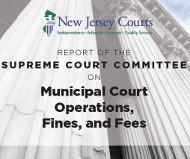9/4/2018
New Jersey Judicial Commission Takes On Ticketing For ProfitPanel commissioned by New Jersey Supreme Court recommends reform to end municipal court use of traffic tickets to generate revenue.

Too many local jurisdictions in New Jersey have been using municipal courts as a source of revenue. That is why state Supreme Court Chief Justice Stuart Rabner gathered a panel of experts to review what could be done about the problem. The commission's report, released in July, detailed a system that often unfairly punished low-income motorists.
"Articles from local press, instances of judicial misconduct and public hearings held by the New Jersey State Bar Association have all together laid out both the public perception and at times the unfortunate reality of the municipal courts as revenue-generators for the municipality, and reaffirmed the need for independence-enhancing reform," the report explained.
Last year, municipal courts generated $400 million in profit, about half of which went to the local government's general fund. The excess revenue comes from a wide assortment of fees imposed on ticket recipients.
"Beyond the assessment and collection of penalties, the municipal courts collect court costs intended to fund their operation," the report explained. "A municipal court can assess court costs up to $33, with all but $5.50 going to the municipality to fund municipal court operations."
The report highlighted the example of Julie, who was accused of driving 65 MPH in a 55 MPH zone. The local prosecutor took the $95 ticket and converted it to "unsafe driving," adding surcharges for court costs, the body armor replacement fund, the autism treatment fund, the spinal cord research fund, the DNA lab fund, the brain injury research fund and the unsafe driving fund. This brought her total bill to $389.
Motorists unable to pay will have their driver's license suspended. The report gives the example of Dan, who lost his right to drive after finding himself unable to pay a $140 ticket. After all the surcharges, his liabilities ballooned to $1538.
"License suspensions also have far-reaching effects," the report noted. "In a survey conducted of individuals that had at that time or previously had their license suspended, 42 percent lost their jobs as a result of the suspension; 45 percent who lost their job as a result of the suspension could not find another job; and 88 percent of those that were unable to find another job reported a decrease in income. Economically destabilized families and dependents of those defendants also suffer the aftermath of these effects."
To avoid these unwanted outcomes, the reoprt provided a number of detailed recommendations, including making it possible for judges to impose alternative sentences such as the use of a restricted license. This would allow indebted motorists to continue to work while paying what they owe. The commission also suggested that old and minor charges, such as parking tickets, should be automatically dismissed.
A copy of the report is available in a 3mb PDF file at the source link below.


